A ‘chief of staff’ and ‘enduring relationships’: The advance of military interests in Parliament
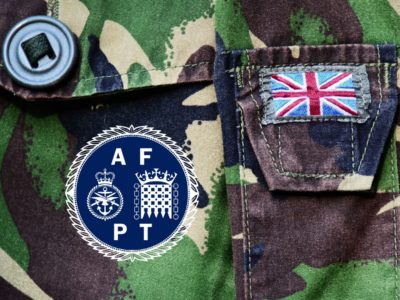
In November 2024, the UK’s Defence Academy posted on X that the Armed Forces Parliamentary Scheme (AFPS), which is run by the Armed Forces Parliamentary Trust, has returned with a record number of participants. At just shy of 60, this means almost one tenth of the House of Commons is currently participating in an arms industry funded military cosplay fantasy that, as we highlight below, is seen by UK Strategic Command as a way to influence MPs. This is an 80% increase on the 33 parliamentary ‘graduates’ from the Scheme in 2023-24.
There are some interesting parallels here with the first Tony Blair administration. As we found in our first investigation into the Scheme, Labour very quickly decided to expand the number of MPs taking part in the Scheme when they came to power in 1997. Whilst significant at the time, it was merely a stepping stone to the ever increasing rise to the size of participation today.
Other changes have occurred since the 2024 election, chiefly that Conservative MP James Gray, the long time Chair of the Scheme and its sibling the All-Party Parliamentary Group (APPG) for the Armed Forces, lost his Wiltshire seat due to constituency boundary changes. Whilst this means he can no longer take part in the APPG, the charitable status of the Armed Forces Parliamentary Trust, and its dual position of being both inside and outside Parliament, allows him to stay actively involved in the Scheme.
According to the Charity Commission, Gray is still the Chair of the Board of Trustees, and all but two of the current Trustees listed were appointed before the 2024 election. Labour MP for Warwick and Leamington, Matthew Western was appointed on 20 November 2024. He had completed the AFPS with the RAF in 2019-20, the Army in 2021-22 and the Royal College of Defence Studies in 2022-23, and was an attendee at the graduation dinner we analysed back in 2022.
The sponsors of the Armed Forces Parliamentary Scheme – and MPs’ participation in it – are some of the world’s largest arms companies.
Joining the board of trustees at the same time as Western was Conservative MP for Hamble Valley, Paul Holmes. At 36, Holmes has been in Parliament since 2019, and was a special advisor in several Government departments before that. He completed the AFPS in 2022-23 with the Navy and was a staunch defender of his party’s former Deputy Chair, Lee Anderson, after Anderson was suspended for making Islamaphobic comments about Labour’s London Mayor Sadiq Kahn.
Since our last investigation of the Scheme in 2023, three ex-officio appointments are now listed on the Trust’s website. Sir Neil Thorne founded the Scheme in 1988 and is the Life President of the Trust. The two Vice Presidents are Lord McFall and Sir Lindsay Hoyle who, as Speakers of the House of Lords and House of Commons respectively, oversee debates and have significant influence in Parliament.
The most recent accounts published on the Charity Commission website show that for 2023-24 the Trust’s income from sponsorships was £120,000 and its expenditure was £125,416. As ForcesWatch have previously reported, the sponsors of the Armed Forces Parliamentary Scheme – and MPs’ participation in it – are some of the world’s largest arms companies.
The sponsors listed as funding the 2023-24 scheme are: Airbus UK, Babcock International, BAE Systems, Boeing Defence UK, DXC Technology, Elbit Systems, General Dynamics UK, Leonardo UK, Lockheed Martin UK, QinetiQ, Raytheon UK and Rolls-Royce. Considering the ongoing genocide in Gaza and the recent proscription of Palestine Action as a terrorist group, the inclusion of Elbit Systems on this list raises serious questions around Parliamentary independence.
The accounts document states that sponsors enter into a rolling annual Sponsorship Agreement but trustees have adopted a policy of recognising sponsorship in the scheme year to which it relates (so publish the list each year despite it never really changing). In fact, the list above is near identical to the list we published in November 2021, bar the addition of Boeing. So, it is likely these companies, which also appear on the Trust’s website, are still the primary sponsors.
The 2024/25 intake
Twitter/X is awash with images from MPs currently undertaking in 2024-25 Armed Forces Parliamentary Scheme, and many of them reference their participation in Commons debates. Whilst it is difficult to get the names of all 60 MP and peers taking part in the 2024-25 Scheme, the following can be confirmed (with a link to their mentions of the Scheme in parliamentary debates): Alan Strickland (Lab), Alex Baker (Lab), Amanda Martin (Lab), Ben Obese Jecty (Con), Charlie Dewhirst (Con), Danny Beales (Lab), Jacob Collier (Lab), Luke Charters (Lab), Mike Reader (Lab), Pam Cox (Lab), Peter Bedford (Con), Peter Swallow (Lab), Samantha Niblett (Lab), Sarah Bool (Con), Sarah Gibson (Lib Dem), Shaun Davies (Lab), Al Pinkerton (Lib Dem), Jonathan Davies (Lab), Tom Gordon (Lib Dem), Kevin Bonavia (Lab), Robin Swann (UUP), Dame Chi Onwurah (Lab) and Vikki Slade (Lib Dem).
With the exception of Robin Swann and Chi Onwurah, all of this group of MPs were newly elected in 2024, and would have joined the Scheme very soon afterwards.
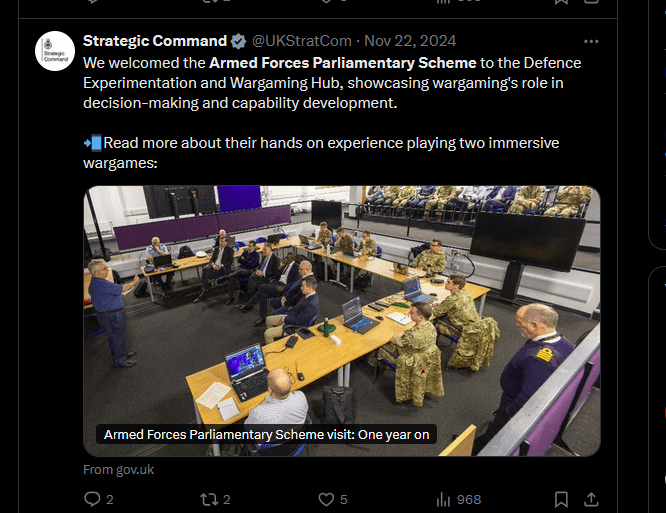
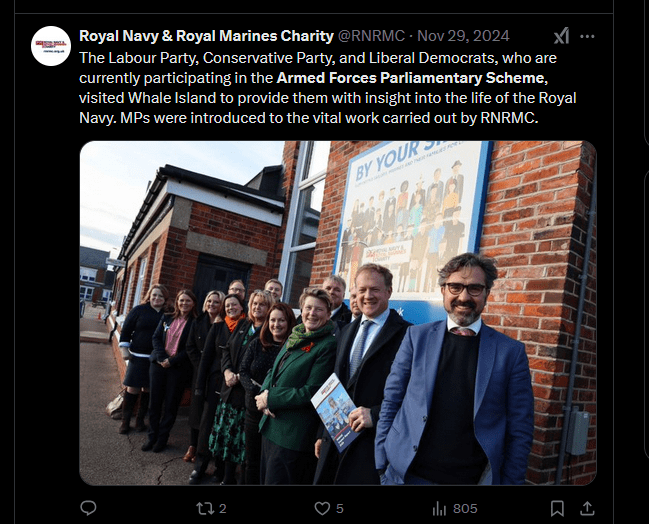
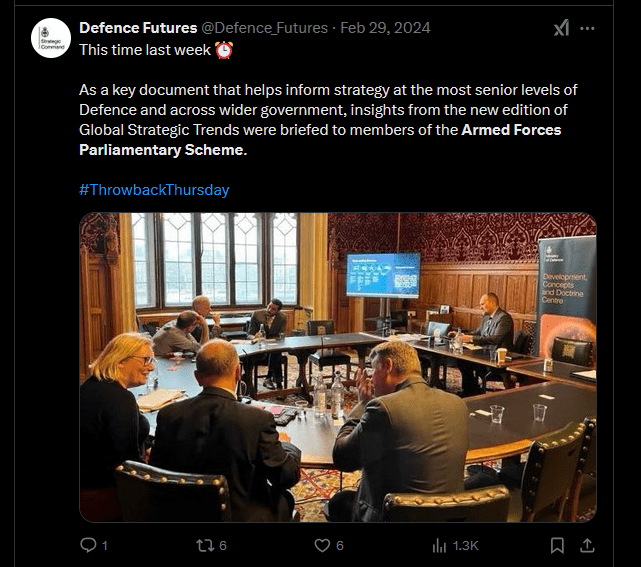
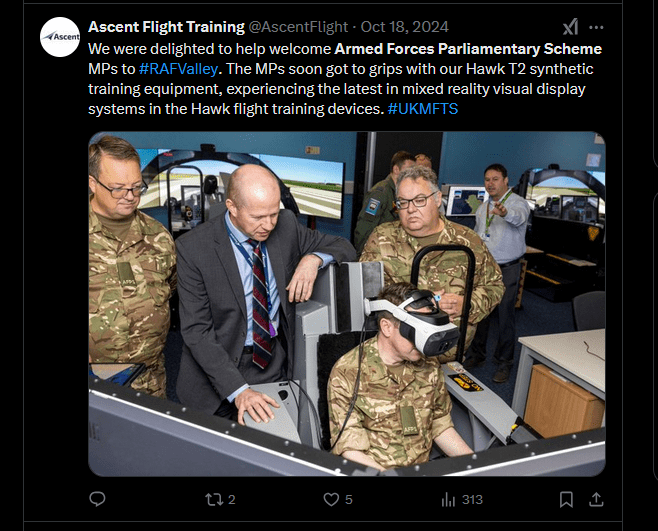

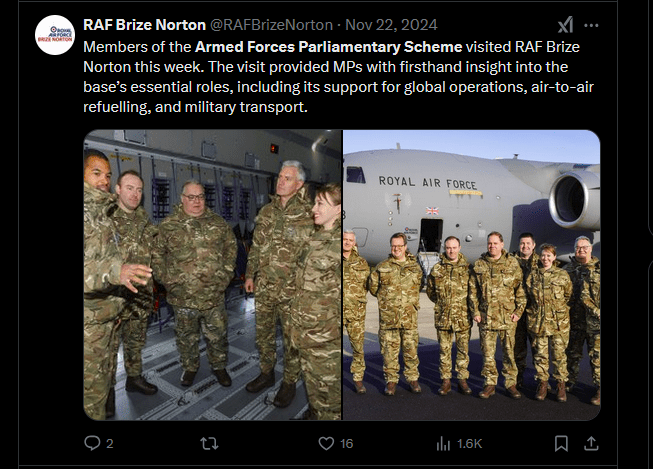
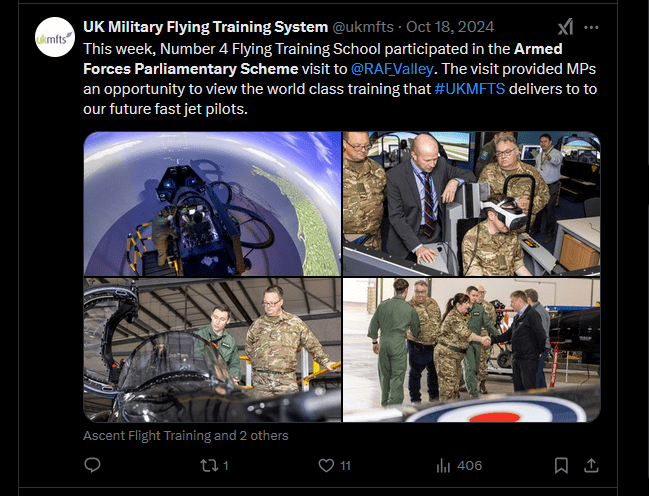
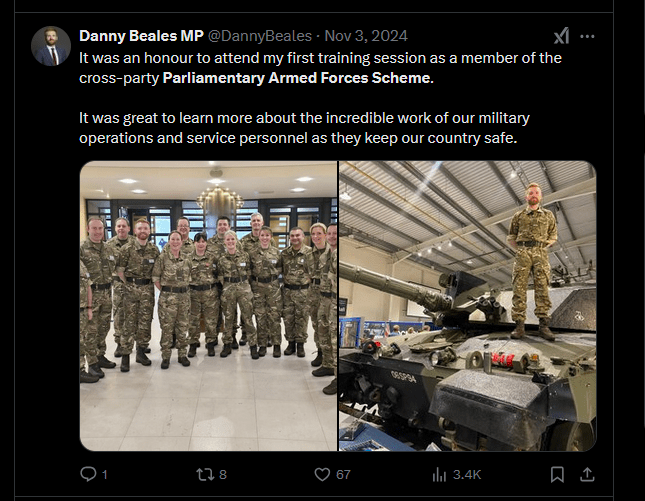
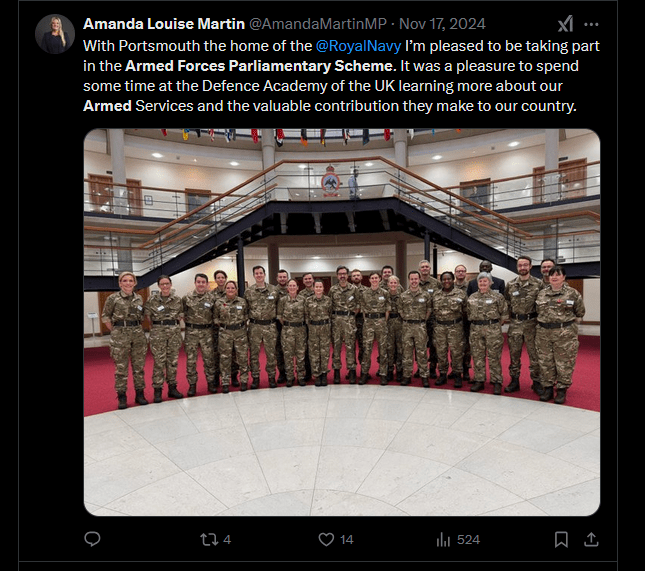
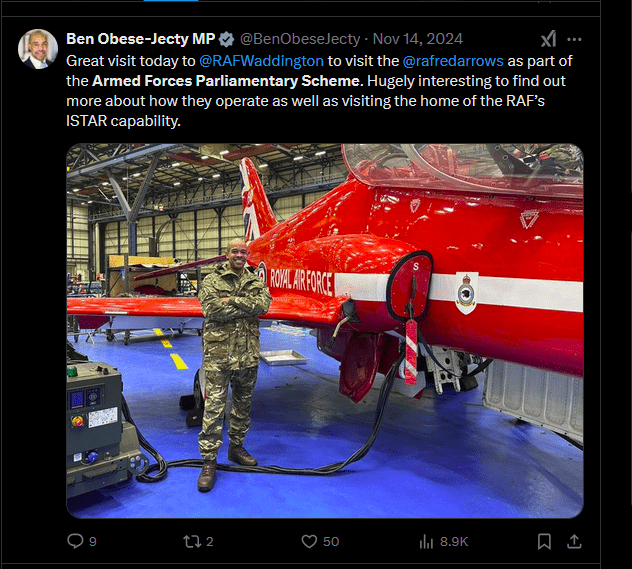
Posts from X about the 2024-25 Armed Forces Parliamentary Scheme
Influencing key audiences
After digging further into the workings of the Scheme, we can reveal that the Ministry of Defence (MoD) plays a more active role in its administration that we first thought. In response to a Freedom of Information (FOI) request asking for the names of all MPs in the 2024/25 cohort, the House of Commons told us that they do not hold the information and we should instead contact the MoD or the Scheme itself. The Scheme, it should be noted, is not a public body so is not covered by Freedom of Information legislation.
This seemingly contradicts an FOI response we received from the MoD in March 2023 which stated that the Trust ‘sits within parliament and has no connections with the MoD’. This request had asked for the amount of funding the MoD had given to the Trust between 2018 and 2023. The answer was that ‘the MoD does not provide any direct financial support to the Armed Forces Parliamentary Scheme’. We uncovered further contradictions in the MoD’s position upon examining the role of the Parliamentary Engagement Officers who act as a bridge between the three services and Parliament, under the stewardship of MoD’s Strategic Command, UKStratCom.
What becomes clear from reading these job adverts is the way in which the military views the AFPS as a way to influence Parliamentarians and employs full-time staff to do this.
Job adverts for Engagement Officers, analysed by ForcesWatch, give clear indications of how the military views the Scheme and demonstrate that whilst the MoD does not provide funding, it has an active and ongoing connection. One advert from 2024 (archived version) stated that role responsibilities include the development of ‘enduring relationships between UKStratCom and a diverse range of Parliamentarians’, provision of ‘targeted engagement opportunities coherent with UKStratCom engagement and messaging for AFPS scheme members’ and ensuring ‘UKStratcom input and attendance at the monthly AFPT meetings.’
Another advert, from 2021, which was for a RAF specific Parliamentary Engagement Officer (see image), stated that the post holder will be responsible for selecting the Parliamentarians who will take part in the Scheme. The person must also organise and attend ‘Single Service Visits’ and have ‘(f)ull engagement with scheme members as necessary throughout the Scheme.’ This suggests a very active role for the MoD, further eroding the idea that the Scheme operates independently.
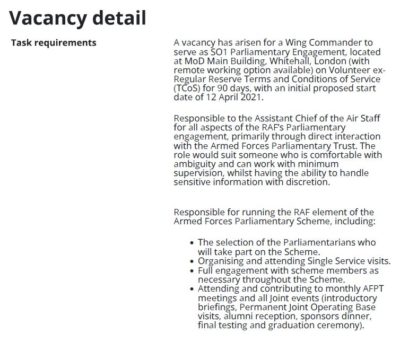
Section of an advert for a Parliamentary Engagement role in the MoD, 2021. Accessed 19 June 2025. Click to enlarge
In further confirmation of the close relationship between the Scheme and the APPG for the Armed Forces, the job adverts also outline the need to ‘(p)lan, oversee and support engagement between UKStratCom and All-Party Parliamentary Groups (sic) for the Armed Forces – in support of UKStratCom aims and objectives.’ The RAF Engagement Officer advert explains that the post holder is responsible for organising the RAF APPG for the Armed Forces events and we assume this is the same for all the services.
Another interesting insight comes at the end of the generalised advert, under the heading ‘Employer Comments’. It is stressed that the post holder must ‘develop their understanding of the Parliamentary audience’, ‘offer a platform to UKStratCom senior leadership to inform and influence key audiences’ and ‘will have close, regular professional and social interactions with Parliamentarians’ through their AFPS work.
What becomes clear from reading these job adverts is the way in which the military views the AFPS as a way to influence Parliamentarians and employs full-time staff to do this – which is a far cry from the passive presentation of the Scheme as a way for MPs to better understand the day to day life of rank-and-file armed forces personnel. One indication of how this might work in practice comes from an X post from Vikki Slade in November 2024, in which the Liberal Democrat MP states:
‘Our defence is in good shape. I am part of the Armed Forces Parliamentary Scheme and I have full confidence in their preparedness from the briefings I am having.’
Well-known figure around the Palace
Alongside the Parliamentary Engagement Officers, there is also a senior member of the armed forces essentially acting as a bridge between the MoD and Parliament. According to a Politics Home article written by James Gray when he was still an MP, ‘the AFPS is administered in Parliament by Lieutenant Colonel Johnny Longbottom, the full-time chief of staff, who is a well-known figure around the Palace.’ In what is becoming a dominant theme, there is no publicly available information on the work that Longbottom carries out.
From the little data we have on Johnny Longbottom, we know that he is a member of the Honorable Artillery Company (HAC), the oldest division of the British Army, and the Army’s only Reserve Surveillance and Target Acquisition (STA) Regiment. He spent time in Afghanistan with the TAC, which he joined in 1993, and has had a long career working within the MoD main building. He was appointed to his AFPS role in September 2013, when the Scheme relaunched with charitable status as the Armed Forces Parliamentary Trust. At the time, James Gray told Parliament that Longbottom was going to be either chief executive or chief clerk, but that the title would be decided at a later date. It is unclear what was decided, but the quote above suggests that he may informally be known as the ‘chief of staff’.
On the 10th anniversary of the relaunch of the Scheme, Gray told the Commons ‘I pay tribute to the people who run it for me. Lieutenant Colonel Johnny Longbottom, in particular, has done great work over those years.’ A year earlier, Labour’s Tonia Antoniazzi told MPs that she pays ‘tribute to the excellent work of Commander Susie Moran from the Royal Navy and Lieutenant Johnny Longbottom, who supported my journey through the scheme.’ Yet Longbottom remains a somewhat elusive figure. In the 12 years since Gray announced Longbottom’s appointment with the Trust, the only other mention of him is in a debate about the RAF centenary in 2018.
We have also learned that the Minister for the Armed Forces, currently Plymouth Sutton and Devenport MP Luke Pollard, has responsibility for the AFPS on the civilian side of the MoD. There is no publicly available information on what this role entails and at the time of writing we are awaiting a response to our FOI request for details on this. Since the 2024 election, Pollard attended the AFPS Graduation Dinner on 29 October 2024, and AFPS alumni event on 28 January 2025 and an AFPS dinner on 18 March 2025. Again, there is no publicly available data on these events.
Creeping influence
While key aspects of the Armed Forces Parliamentary Scheme haven’t changed, it has grown significantly in the last year with a large cohort of parliamentarians – many of whom are new MPs – taking part. Only fragments of information about the Scheme are in the public domain and our experience is that freedom of information requests yield little more. But what we have found suggests that the MoD have paid staff to progress their influence via the Scheme and that both the MoD and the AFPS have a close relationship to the All Party Parliamentary Group for the Armed Forces. As we discussed in our recent article, the APPG for the Armed Forces has received over half a million pounds of sponsorship from many of the same arms companies that sponsor the Scheme. With a full-time administrator, or ‘chief of staff’, and the involvement of dozens of parliamentarians and prominent figures, the presence of military interests in the heart of the UK’s democracy is on the rise.
See more: military in society, UK Parliament, arms industry, democracy
Like what you read?
> Sign up for our newsletter or blog notifications
> Support our work – from just £2 a month











